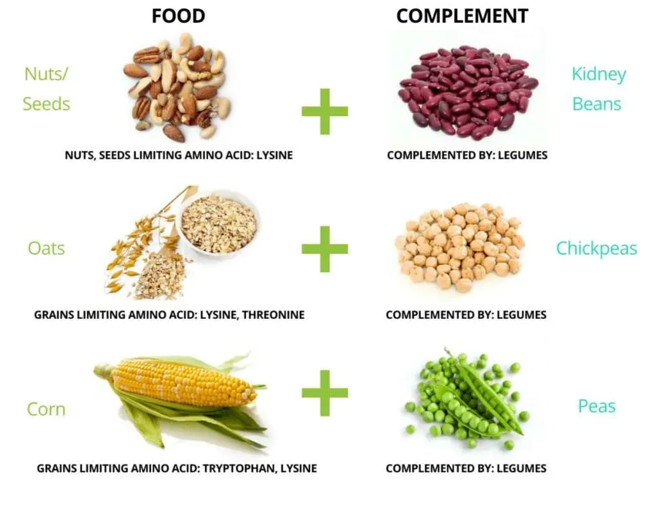Looking back, our early ancestors had relied predominately on plant-based protein foods like grains and nuts. But then evolution happened and the advent of hunting and the mastery of fire allowed early humans to access and utilize animal protein more efficiently for the purpose of survival. Now moving forward to this era, there is a still a misconception that meat is the only food that the powerful ones eat, not vegetables. But recent research findings provide us the information that even the strongest one can build strength by following a plant-based protein diet.
A complete protein is the one which contains all nine essential amino acids(histidine, leucine, isoleucine, lysine, methionine, phenylalanine, threonine, tryptophan and valine). Now that is why it is a debatable topic because these essential amino acids are easily obtained through animal-based proteins. But it does not mean plant-based proteins lack all the essential amino acids. And lacking one or two essential amino acids will not make animal proteins a superior one. When you are on the plant-based protein diet, you cannot help but look it as a sustainable alternative but you should not consider it as inadequate. By consuming a variety of plant foods throughout the day, one can easily meet their amino acid needs. Even Muscle growth depends on adequate protein intake, resistance training, and overall nutrition, all of which can be achieved with a plant-based protein diet. Additionally, not all animal proteins are equal. The nutritional profile of animal proteins can vary widely. For example, fish is high in omega-3 fatty acids, which are beneficial for heart health, while red meat can be high in saturated fats. Choosing leaner cuts of meat and incorporating a variety of animal protein sources, including fish and poultry, can help balance the diet.
Another reason why Animal proteins are put on the spotlight is that their bioavailability is higher compared to plant proteins. But they can still be adequate for meeting nutritional needs with proper planning. Compounds like phytates, oxalates, and tannins, found in many plant foods, can bind to proteins and minerals, reducing their absorption. However, cooking, soaking, fermenting, and sprouting can reduce the levels of these anti-nutrients and improve protein bioavailability.
Strategies to Enhance Plant Protein Bioavailability
To maximize the bioavailability of plant proteins, consider the following strategies:
- Diverse Protein Sources: Combine different plant-based protein sources to ensure a complete amino acid profile. Examples include rice and beans, hummus and whole-grain pita, or lentils and quinoa.
- Processing Methods: Use cooking methods such as soaking, fermenting, and sprouting to reduce anti-nutrient levels and enhance digestibility.
- Food Pairing: Pair plant proteins with vitamin C-rich foods to enhance the absorption of heme iron (e.g., adding lemon juice to a spinach salad or eating bell peppers with beans)
- Fortified Foods: Incorporate fortified plant-based foods into your diet to ensure adequate intake of nutrients that might be less bioavailable from plant sources, such as vitamin B12, iron, and calcium.
So, it is time to stop having outdated assumptions on plant based proteins and start to think that by incorporating these strategies into your diet, you can ensure you meet your protein needs, support muscle strength, and maintain overall health on a plant-based diet. Monitoring your intake and staying hydrated are also crucial for optimal nutrition and performance. not all animal proteins are equal. The nutritional profile of animal proteins can vary widely. For example, fish is high in omega-3 fatty acids, which are beneficial for heart health, while red meat can be high in saturated fats. Choosing leaner cuts of meat and incorporating a variety of animal protein sources, including fish and poultry, can help balance the diet.
Ways to get Vegetarian Protein everyday (Minimum of 70g)




Comments
Post a Comment